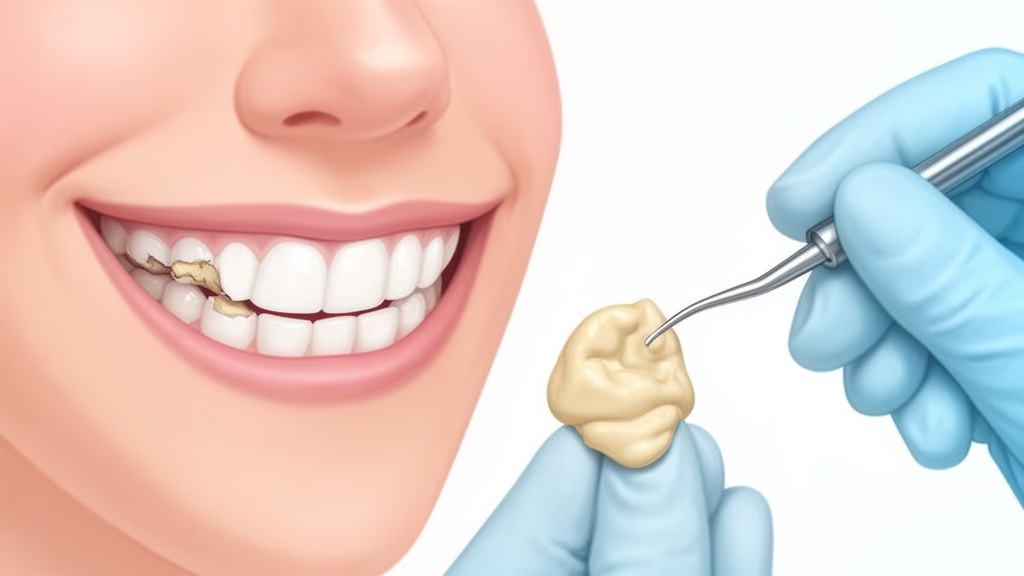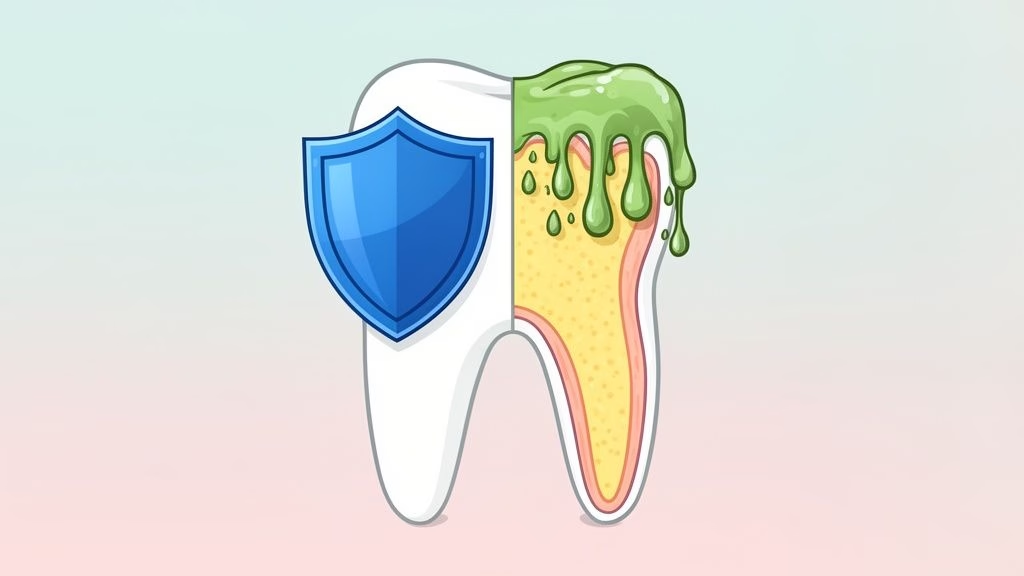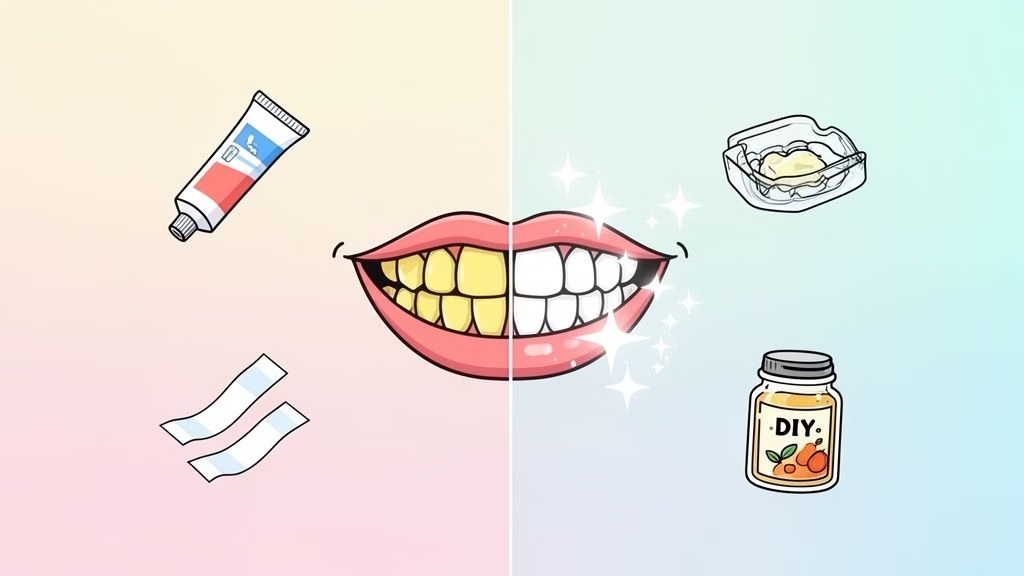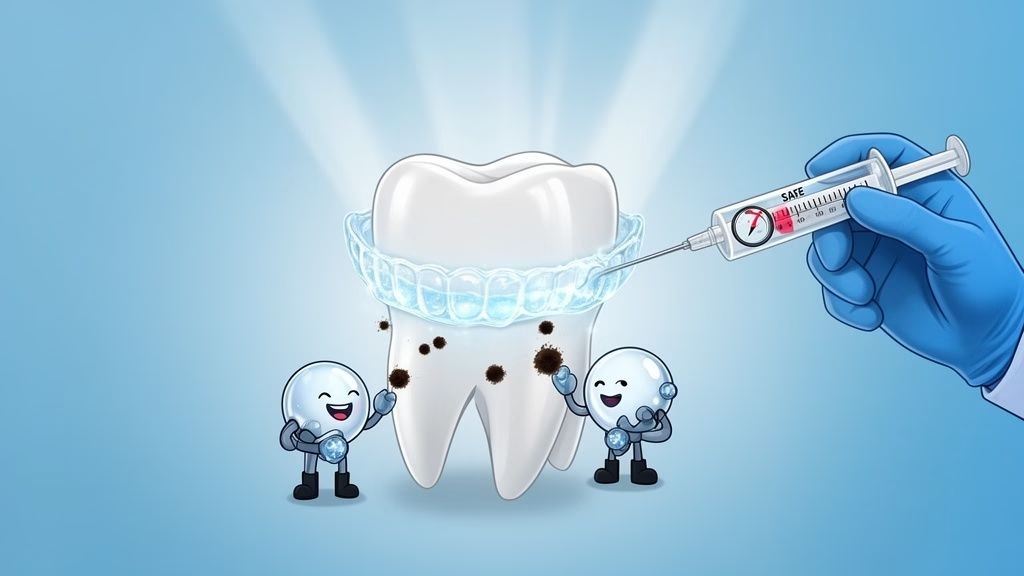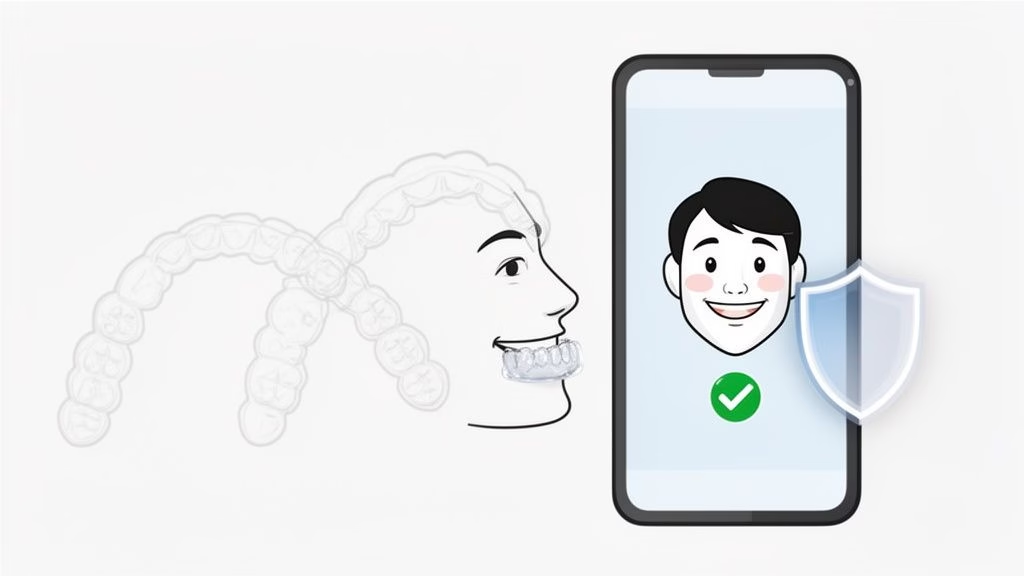What is Oral Surgery? Expert Insights & What to Expect
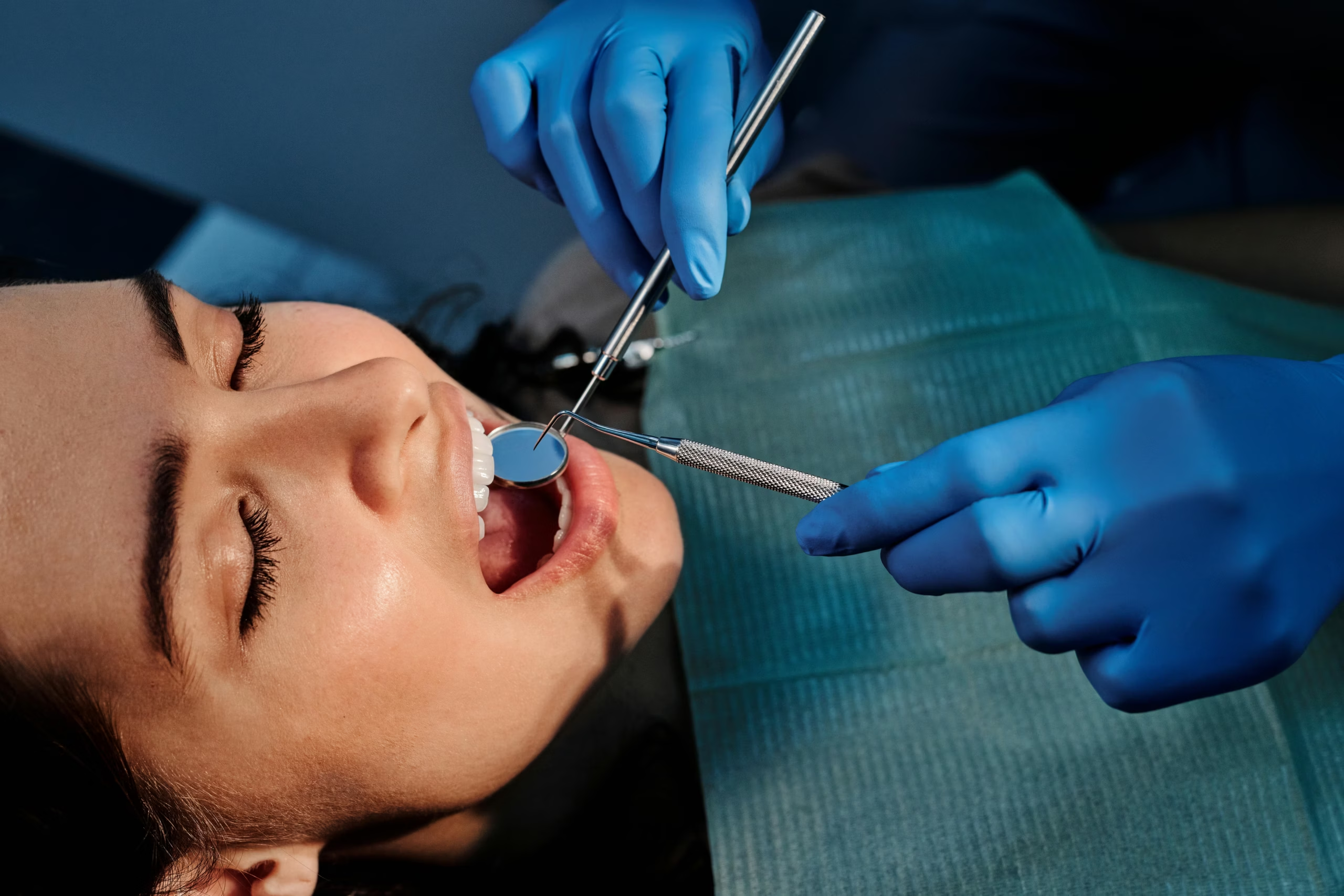
Oral surgery is a highly specialised branch of dentistry that deals with the diagnosis and surgical treatment of diseases, injuries, and defects affecting the head, neck, face, and jaw.
Think of it this way: your regular dentist is like your GP, handling your day-to-day dental health. But when a problem becomes too complex or requires a surgical solution, they’ll refer you to an oral surgeon – the specialist with the advanced training needed for the job.
Understanding the Role of an Oral Surgeon

While your general dentist is the expert for cleanings, fillings, and routine check-ups, an oral surgeon has undergone years of extra, hospital-based training focused entirely on surgical procedures and administering anaesthesia. They are the go-to experts when a condition is simply beyond the scope of general dentistry.
This extensive training means they are uniquely equipped to manage a whole host of complex issues. Whether it’s removing deeply impacted wisdom teeth that are causing havoc, or performing intricate reconstructive surgery following a traumatic injury, their expertise is crucial for a safe and successful outcome.
When Is a Specialist Needed?
So, when does a trip to the dentist turn into a referral to a surgeon? There are several common scenarios that call for a specialist’s touch.
Here’s a quick look at some of the most frequent issues that will land you in an oral surgeon’s chair.
Common Reasons for an Oral Surgery Referral
| Condition | Common Symptom | Why a Specialist Is Needed |
|---|---|---|
| Impacted Wisdom Teeth | Pain, swelling at the back of the jaw, and infection | These teeth are often trapped under the gums or bone, requiring surgical extraction to prevent damage to other teeth. |
| Complex Tooth Extractions | A tooth broken off at the gum line | When there’s little to no tooth visible, a surgeon must open the gum tissue to access and remove the remaining roots. |
| Facial Trauma Repair | A fractured jaw, broken facial bones | Realigning and stabilising bones after an accident requires deep knowledge of facial anatomy and surgical skill. |
| Corrective Jaw Surgery | Significant overbite/underbite, difficulty chewing | This involves surgically repositioning the jawbones to improve function and facial balance, a highly complex procedure. |
These situations are prime examples of where a specialist’s skills are non-negotiable.
Modern oral surgery leans heavily on advanced imaging to get the job done right. Technologies like Cone Beam Computed Tomography (CBCT) give surgeons incredibly detailed 3D views of your teeth, soft tissues, and bone structure. This precision is vital for accurate diagnosis and meticulous planning. It’s why CBCT dentistry is now considered a cornerstone of the field.
An oral surgeon’s job isn’t just about removing teeth. It’s about restoring function, improving health, and sometimes even rebuilding a person’s smile and confidence after an injury or due to a congenital condition.
Getting that specialist referral through traditional channels can sometimes feel like a waiting game. For urgent situations or if you just want a quick second opinion, on-demand services like Toothfairy offer a faster route. They can provide virtual consultations to help you understand what’s going on and connect you with the right specialist, often cutting out unnecessary delays.
A Look at Common Oral Surgery Procedures
Let’s be honest, the words “oral surgery” can sound a bit daunting. But in reality, it’s just a term for a handful of common procedures that tackle dental problems head-on. Knowing what to expect can really help take the mystery, and the anxiety, out of the whole process.
These aren’t your everyday fillings or cleanings. Oral surgery steps in when there’s a deeper structural issue that needs sorting out, aiming to get your health, function, and comfort back on track.
This infographic gives a great visual breakdown of three of the most common types of oral surgery you’re likely to encounter.
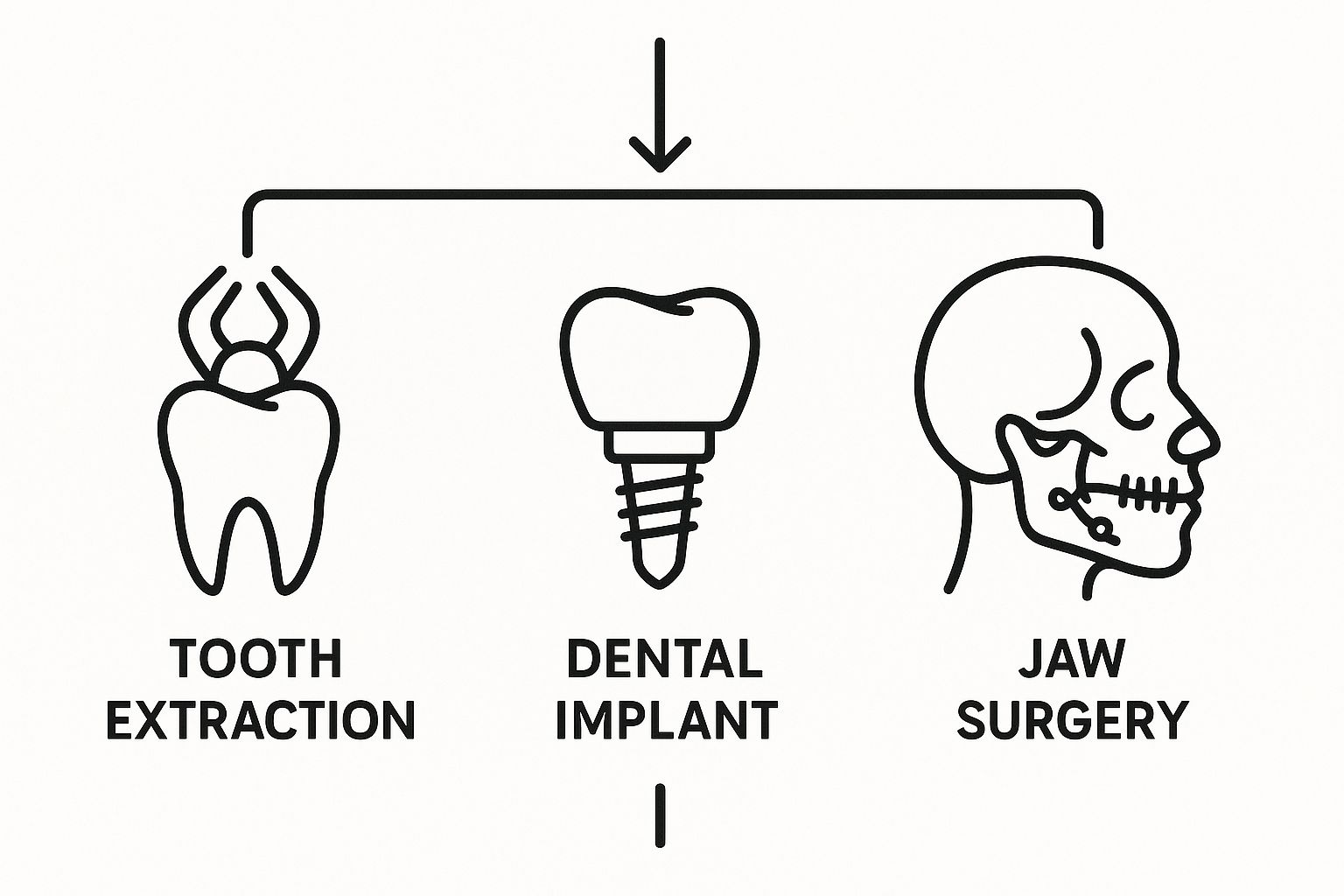
From straightforward extractions to more involved reconstructive work, each one has a specific job to do.
Complex Tooth Extractions
Probably the most famous procedure is wisdom tooth removal. Officially known as third molars, these teeth are the last to arrive and often find there’s no room left at the party. They can become impacted, which is just a technical way of saying they’re stuck under the gum or growing in at an awkward angle.
An impacted tooth isn’t just a bit of a nuisance; it can lead to real pain, infection, and even cause damage to the teeth next door. That’s when an oral surgeon steps in to remove them safely and prevent any future trouble.
Dental Implant Placement
If you have missing teeth, dental implants are considered the best solution available today. They act as an artificial tooth root, creating a rock-solid base for a replacement crown. The procedure involves the surgeon placing a small titanium post into the jawbone, which requires a huge amount of skill and precision.
It’s a process where planning and accessibility are everything. For many, the path to a full smile feels impossible due to high costs and logistical hurdles. This is where a service like Toothfairy makes a real difference, offering a clear and affordable way to get dental implants and manage the entire journey from the first chat to the final crown.
Corrective Jaw Surgery
Also known as orthognathic surgery, this procedure is all about realigning the jaw and teeth. It’s a game-changer for people with bite problems—like a severe overbite or underbite—that are too significant for braces alone to fix. The results can dramatically improve how a person chews, speaks, and even breathes.
The real aim of any oral surgery isn’t just to patch up a problem. It’s about genuinely improving a patient’s quality of life, whether that means ending chronic pain, being able to enjoy food again, or simply smiling with confidence.
Jaw surgery is a team effort, usually involving both an oral surgeon and an orthodontist. Once the jaw is in its new position, you’ll typically need some orthodontic work to get the teeth perfectly aligned. While traditional braces are an option, modern aligners offer a much more discreet and convenient path. Unlike some specific aligner brands with hefty price tags, Toothfairy provides a smarter, more affordable way to straighten teeth and achieve that perfect finish.
The UK Dental Access Crisis and Your Options

Knowing what oral surgery entails is one part of the puzzle. The other, much trickier part, is actually getting access to it here in the UK. For many, finding specialist dental care feels like hitting a brick wall, with long waiting lists and a simple lack of available dentists standing in the way.
This problem has become so widespread that we now have what people are calling ‘dental deserts’—whole areas where finding an NHS practice taking on new patients is virtually impossible. When you’re in agony with an impacted wisdom tooth or facing a dental emergency, being told the next opening is months away is the last thing you need. This isn’t just about enduring pain; it’s about a small problem potentially spiralling into something far more serious.
The Reality of Dental Care Delays
The numbers don’t lie. Projections suggest that over 40% of Britons could be caught in a critical dental access crisis by 2025. The situation is fuelled by a shortage of NHS dentists and massive regional gaps; in some parts of the country, over 97% of practices aren’t accepting new adult NHS patients. These aren’t just statistics; they represent a system stretched to its breaking point. You can discover more insights about the UK’s dental access challenges and what this means for people needing care.
For anyone who needs an urgent assessment for oral surgery, these delays are more than an inconvenience—they’re a genuine barrier to getting relief.
The traditional route to seeing a dentist simply isn’t working for everyone anymore. When you can’t get an appointment, you’re often left to cope with pain and worry alone, turning a manageable issue into a huge source of stress.
A Modern Solution to an Old Problem
This is exactly where new thinking comes in. Instead of waiting weeks just for an initial chat, on-demand dental apps are completely changing how we access care. Toothfairy was created specifically to tackle this crisis head-on.
Using an app, you can sidestep the usual gatekeepers and queues. Toothfairy puts you in direct contact with a qualified dentist for a video consultation, often on the very same day. It means you can get expert advice for a dental emergency, talk through your symptoms, and secure a referral for oral surgery without even leaving your house. It’s about getting you the right care, right when you need it most.
How to Manage Dental Anxiety Before Surgery
The thought of any surgery can be a bit daunting, and let’s be honest, it’s often more intense when it involves your mouth. This kind of anxiety is incredibly common, but it’s also a major hurdle that stops people from getting the care they need. The good news? There are practical, effective ways to manage those nerves and walk into your procedure feeling much more in control.
It all starts with a simple conversation. Chatting openly with your surgeon is the single most important thing you can do. Ask them everything—what the procedure involves, what your sedation options are, and what recovery will really look like. Getting clear answers turns vague fears into a manageable plan, which can make all the difference.
Facing your dental fears isn’t about being fearless; it’s about being well-informed. Knowing your options and having a clear plan transforms an intimidating experience into a manageable one.
Actionable Strategies to Ease Your Mind
Before you even leave the house for your appointment, a few simple mindfulness techniques can work wonders. Deep breathing exercises are fantastic for slowing your heart rate and calming your nervous system right down. Just a few minutes of focusing on a slow, steady breath can genuinely reduce that feeling of panic.
It also helps to recognise that what you’re feeling is a perfectly normal response to a stressful event. This is often described as situational anxiety, and just putting a name to it can help normalise your feelings.
This isn’t just a minor issue in the UK; it’s a widespread problem. In fact, over 1 in 4 Britons suffer from such debilitating dental anxiety that they put off or completely avoid appointments. This fear can often be traced back to a bad experience in the past and, sadly, can lead to serious health problems down the line. You can learn more about the impact of dental anxiety in the UK.
This is where modern dental apps like Toothfairy are changing the game. They offer a brilliant way to ease this anxiety right from the start. By having a virtual consultation from your own sofa, you can meet your dentist and discuss your concerns in a familiar, low-stress setting. It’s all about getting clear information upfront, empowering you long before you ever step into the surgery.
Right, so you’ve had your surgery. What happens next? Knowing what to expect during recovery is half the battle, and a bit of prep work can make all the difference between a smooth heal and a stressful one. While your surgeon’s specific advice is gospel, there are some general tips that hold true for most procedures.
Your number one job immediately after surgery is to rest. Seriously. Your body is working hard to heal, so give it a break and plan to take it easy for at least the first 24 to 48 hours. That means putting your feet up and avoiding any heavy lifting or strenuous exercise, which can ramp up bleeding and swelling.
Eating Well and Keeping Things Clean
For a little while, your menu will consist of soft foods that don’t require much, if any, chewing. We’re talking smoothies, lukewarm soups, yoghurt, and maybe some mashed potatoes. Staying hydrated is key, but steer clear of straws – the suction can disturb the crucial blood clot forming in the surgical site, leading to a painful condition called dry socket.
Keeping your mouth clean is vital for preventing infection, but you’ll need to be gentle.
- The First Day: Don’t rinse your mouth at all. Let the area begin to heal undisturbed.
- From Day Two: Start rinsing gently with warm salt water a few times a day, particularly after you’ve eaten. This helps keep the area clean without being too aggressive.
- Brushing: Carry on brushing your other teeth as usual, but give the surgical area a wide berth for a few days. Your surgeon will let you know when it’s safe to brush there again.
A good recovery really comes down to following the aftercare instructions to the letter. Simple things, like what you eat or how you rinse, play a massive role in how well and how quickly you heal.
Handling Discomfort and When to Seek Help
A bit of swelling and soreness is completely normal, especially after something like a wisdom tooth extraction. It tends to peak around the third day before it starts to get better. Your dentist will likely recommend over-the-counter painkillers or prescribe something stronger to keep you comfortable.
It’s important, though, to know what’s normal and what isn’t. Keep an eye out for red flags like severe pain that gets worse instead of better, bleeding that won’t stop, or signs of infection such as a fever. If you experience any of these, you need to get professional advice quickly.
This is where having a service like Toothfairy in your back pocket offers real peace of mind. Instead of anxiously waiting for office hours, you can jump on a secure video call with a dentist for immediate post-op support. It means getting clear answers and reassurance exactly when you need them most.
Your Oral Surgery Questions Answered
Thinking about oral surgery can feel a little daunting, and it’s completely normal to have a lot of questions. We’ve put together some straightforward answers to the things people most often ask, helping you get a clearer picture of what’s involved.
Let’s tackle some of the most practical concerns, from pain and cost to whether a procedure is even necessary.
Will My Oral Surgery Procedure Be Painful?
This is usually the first question on everyone’s mind, and the answer is reassuring. Modern oral surgery is built around your comfort. Before anything begins, you’ll be given effective anaesthesia, so you won’t feel any pain during the actual procedure.
Afterwards, some discomfort is normal, but it’s very manageable. Your surgeon will give you specific aftercare instructions and often a prescription for pain relief. Following their advice and getting plenty of rest is the key to a smooth and comfortable recovery.
How Much Can I Expect to Pay for Oral Surgery?
The cost of oral surgery really does vary. It all comes down to what procedure you need, how complex it is, and whether you go through the NHS or choose private care.
NHS treatment has set fees but can come with long waiting lists, which isn’t ideal if you’re in pain. Private care gets you seen much quicker, but the costs are higher.
This is where services like Toothfairy are changing the game. They bring transparency to private care by giving you clear cost estimates upfront and connecting you with affordable options, so you can make a decision that works for you without the wait.
Is It Always Necessary to Remove Wisdom Teeth?
Not at all. Plenty of people keep their wisdom teeth their whole lives without any issues. Extraction is only usually recommended if they’re causing problems.
This typically happens when they are impacted (meaning they’re stuck and can’t grow in properly), leading to pain, infection, or damage to the neighbouring teeth. A proper evaluation, including X-rays, is the only way to know for sure. A virtual consultation is a great first step to get a professional opinion without having to commit to a full visit.
Ready to take control of your dental health? Whether you need an emergency consultation, a second opinion, or want to explore smarter, more affordable ways to handle cosmetic dental work or straighten your teeth, Toothfairy is here to help. Get on-demand access to qualified UK dentists right from your phone.
Book your virtual consultation today at Toothfairy
Last updated on October 13, 2025

Toothfairy Care Team
Toothfairy, is the world's smartest dental app, that connects patients to a dentist for a range of issues, from emergencies, cosmetics, prescriptions to virtual exams.
Toothfairy Care Team
Toothfairy, is the world's smartest dental app, that connects patients to a dentist for a range of issues, from emergencies, cosmetics, prescriptions to virtual exams.
